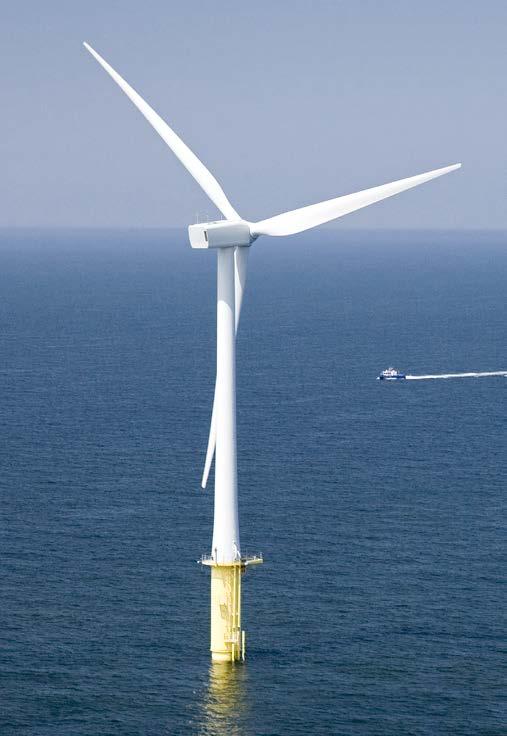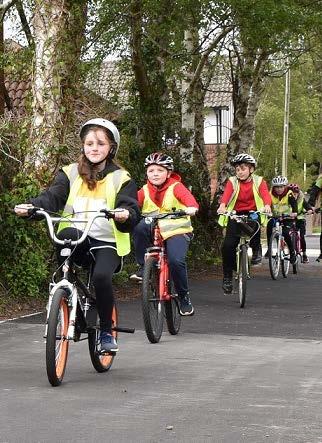
14 minute read
A Greener Wales
In 2019, we were one of the first governments in the world to declare a Climate Emergency. We have remained focused on the importance of the climate crisis in the midst of the response to the coronavirus pandemic. Tackling the climate emergency requires serious and sustained action and collaboration here in Wales and at a global level. This year we have continued to make Wales a green, resilient and socially responsible country. We are working to reduce our carbon emissions, promote more sustainable transport use and ensure our natural environment can flourish.
Responding to the climate emergency
In 2019 we published our Low Carbon Delivery Plan, presenting a comprehensive assessment and analysis of greenhouse gas emissions in Wales and bringing together a set of cross-government policies to reduce emissions. In 2021 we will bring forward regulations to set in law a target date for Wales to reach Net Zero emissions, making us the only part of the UK to secure an earlier, evidence-based target to reach that goal. Renewable energy has a key role to play in our response to the climate emergency. The Energy Generation 2019 report, published as part of our 2020 Wales Climate Week, shows more than half of Wales’ electricity needs were met by renewables last year, up from 43% in 2016. It also highlights that there were 72,841 renewable energy projects in Wales in 2019 – 3,841 more than in 2018. We have worked with all regions of Wales on Regional Energy Strategies, which will set out actions to adopt low carbon energy sources and make the most of opportunities for clean growth in each region. We created the Welsh Government Energy Service in 2018 to help create a net zero public sector by 2030. Since it was created, the service has helped to develop 83 energy projects which will save 259,000 tonnes of CO2 over their lifetime, as well as saving the public sector £118m. We have approved the Pembroke Dock Marine Swansea Bay City Deal project business case, which will create a world-class centre for marine engineering with an immediate focus on low carbon energy. The project is expected to generate more than 1,800 jobs in the next 15 years and £73.5m a year for the regional economy. The amount of municipal waste recycled in Wales has increased from 5% in 1999 to 65% today, exceeding our statutory target. As of March 2020, we are the best nation in the UK, second in Europe and third in the world for household waste recycling. In September 2020, we launched the Be Mighty, Recycle campaign, taking us a step closer to our goal of becoming a zero waste nation by 2050.

We have made more than £40m of Circular Economy Funding available, supporting innovative projects to reuse materials and reduce waste in every part of Wales. During the pandemic we have worked with FareShare Cymru to expand its operations in Wales, ensuring surplus food is redistributed to those in need. We have provided funding to Repair Café Wales, bringing communities together to learn and share skills of repair. In December 2020, we announced an innovative digital trial of a Deposit Return Scheme in Conwy and we are consulting on a Circular Economy Strategy which sets out the next steps towards becoming a zero waste, net zero carbon nation. We published an Agriculture white paper in December 2020, outlining our long-term approach to agriculture in Wales and paving the way for an Agriculture (Wales) Bill in the next Senedd term. It sets out how we will work collaboratively with farmers to halt and reverse the loss of biodiversity in Wales and fight global climate change. It proposes a new Sustainable Farming Scheme, which will reward farmers appropriately for producing non-market goods in a sustainable way – such as improved soil or clean air, over and above the levels set by regulation. It will also provide advice and support for farmers and farm businesses.
Safeguarding and improving our communities and homes
In November 2019, we published our climate change adaptation plan for Wales: Prosperity for All – A Climate Conscious Wales, setting out how we are protecting our environment and adapting our homes, communities, businesses and infrastructure to deal with the impact of climate change. We have invested £390m in flood risk management from 2016 to 2021, reducing the risk to more than 45,000 properties across Wales. In response to the devastation caused by Storms Ciara and Dennis, we were able to provide support of up to £1,000 for each household affected, alongside £2.5m of support for businesses hit by flooding and £4.4m for flood repairs. We have made equivalent support available for households affected by Storm Christoph in 2021. Work started on the £30m East Rhyl Coastal Defence Scheme in April 2020. The scheme, which includes 128,000 tonnes of rock armour and 600 metres of new sea defence wall and promenade, will reduce the flood risk to 472 properties. We provided £2m of funding for 10 natural flood management projects across Wales, managing flood risks to property and reducing pressure on hard flood defences by restoring and expanding woodland and wetland habitats. One scheme in Neath Port Talbot will reduce the risk for up to 250 homes and more than 150 businesses. We have continued to take urgent actions to improve coal tip safety, including establishing the Coal Tip Safety Task Force and commissioning the Coal Authority to undertake ground checks on high risk tips. Following our repeated calls, the UK Government has provided £9m to support coal tip maintenance works. We continue to work with the UK Government to agree a long-term settlement recognising the full legacy issues involved. In March 2020, the First Minister launched a new free-phone Coal Authority helpline enabling the public to report any concerns about coal tips.
In August 2020, we published our Clean Air Plan, which sets out the actions we are taking to improve air quality and reduce the impacts of air pollution on human health, biodiversity, the natural environment and our economy. It draws on the positive impact of the pandemic. A white paper consultation towards a Clean Air (Wales) Bill has started, which will enable ambitious air quality targets and measures to ensure that all areas of society play their part in reducing air pollution. In January 2021 we launched a white paper consultation on reducing emissions from domestic burning, protecting people from fuel poverty and improving air quality. In August 2020, we launched the Optimised Retrofit Programme, an innovative and comprehensive new approach to decarbonising Welsh homes. This programme takes into account complex factors like the fabric and materials our homes are made from, the way we heat our homes and the way energy is supplied so we can upgrade homes well at an optimised cost. In November 2020, the scheme was expanded from £9.5m to £19.5m to fund more of the exceptional projects submitted for funding. We published our Tackling Fuel Poverty 2020-35 plan for consultation in September 2020, outlining how we will continue to help people struggling to meet the cost of their energy needs. We continued to invest in the Warm Homes Programme, which has improved the energy efficiency of more than 61,400 homes and provided advice and support to more than 144,800 people since 2011.
Green, sustainable transport for the future
We have seen a huge change in how people use transport this year, creating challenges and opportunities in the sector. The pandemic has caused unprecedented challenges for public transport in 2020-21 – in response we have allocated £140m to local authorities through our Bus Hardship Fund and Bus Emergency Scheme, helping critical workers get to work and ensuring that bus operators reshape services to put passengers first. Over this Senedd term, we will have invested £1.3bn on supporting rail services and delivering rail infrastructure improvements. Despite rail infrastructure not being devolved, in 2020-21 we committed more than £200m of capital funding to bring forward the delivery of the South Wales Metro and North East Wales Metro along with delivering other rail infrastructure improvements to benefit passengers. Llwybr Newydd, our new draft transport strategy for Wales, outlines our long-term vision for an accessible and sustainable transport system, which is good for people, the environment and for Wales. The final version will be published in March 2021. Transport for Wales, which was established in 2015, has expanded the scope of its work this term to support a truly integrated public transport system across Wales. It has continued to deliver essential rail services this year as well as driving forward improvements to train stations. This includes improvements to 13 stations between Wrexham Central and Upton, and new ticket machines with improved facilities for Welsh speakers and people with visual impairments. We have also started work to turn space in stations into vibrant community hub facilities.


In October 2020, we announced the Wales and Borders rail franchise would be brought under public control as a result of falling passenger numbers because of the pandemic. The move will secure the future of passenger services in Wales and the Borders area, protect jobs and maintain Welsh Government’s ambitious plans for the South Wales Metro. We invested more than £95m in active travel schemes across this Senedd term, and in July 2020 we announced £38m of grants to local authorities across Wales for active travel and road safety schemes – the largest ever investment in local active travel improvements. This includes 25 largescale Active Travel Fund schemes and 22 Safe Routes in Communities projects to create safe walking and cycling routes to schools. We have continued to reduce the carbon impact of our roads, taking steps such as upgrading street lighting to more energy efficient systems and procuring Ultra Low Emission Vehicles for our Traffic Officers. We accepted the recommendations of the 20mph Task Force Group, which found that a 20mph default speed limit for restricted roads would reduce collisions and encourage active travel. We also accepted the recommendations from the Pavement Parking Task Force Group, taking steps towards saving lives, particularly for people with visual impairments, and rebalancing our environment in favour of pedestrians. We have provided nearly £1.9m to local authorities this year through our Ultra Low Emissions Vehicle Transformation Fund, supporting schemes such as an electric vehicle charging hub in Carmarthenshire, park and ride charging provision in Anglesey and charging points for taxis in Cardiff. There are now more than 1,100 electric vehicle charging points in Wales, almost doubling those available in June 2019. Funding has also been used to transition towards a zero emission bus and taxi fleet. We launched a trial of a new public transport service, Fflecsi, in May 2020. This collaborative scheme replaces several scheduled local bus services with more flexible services that can pick up and drop off in a service area by request rather than at fixed bus stops.
In June 2019, we decided not to go ahead with an M4 relief road, putting Wales’ communities and natural heritage first and safeguarding the future of the Gwent Levels wetlands. Instead, the South East Wales Transport Commission was set up to look at sustainable ways to tackle congestion on the M4 around Newport. Its final report was published in November 2020 with 72 recommendations, and we are establishing a delivery unit to comprehensively address these actions. The dualling of the A465 Heads of the Valleys Road, a key part of our strategic road network, will help to draw traffic away from the M4, as well as creating immense social and economic benefits for Wales. Construction on sections 5 and 6 of the road will begin in 2021. Our Green Corridors initiative has invested £1.5m to improve biodiversity and to protect and restore the natural environment around our strategic trunk road network. This includes planting 25,000 native trees and shrubs and 55,000 bulbs, sowing five hectares of wildflowers and actively managing a further 13 hectares of road verges to benefit pollinators and provide attractive landscapes. We are committed to ensuring that trunk road and motorway improvement schemes minimise their impact on the environment. As work on the A465 Section 2 Gilwern to Brynmawr nears completion, evidence suggests that measures to establish 24 hectares of deciduous woodland have helped preserve bat numbers over the five-year life of the project.
Wales has a huge variety of habitats supporting many species of international importance. Access to quality green spaces for exercise or simply to experience nature has been particularly important during lockdown, especially for those without gardens. However, we have seen that biodiversity is in decline with potentially irreversible consequences for our unique and treasured natural environment. We have taken action across this term to ensure that Wales’ flora and fauna can thrive for many generations to come. With our exit from the European Union, we have an opportunity to consider an integrated fisheries policy, which meets the needs of Welsh fishers and our coastal communities. We will build on the views provided in the Brexit and our Seas consultation and continue to work, in collaboration with our key stakeholders, to deliver our Future Fisheries Policy. The Welsh Fisheries Monitoring Centre was operational ahead of the end of the European transition period, ensuring Wales carries out new and continuing responsibilities as part of an independent coastal state. Hundreds of community groups across Wales have benefited from our new £6.8m Local Places for Nature programme, which is transforming everyday access to nature and investing in the quality of local green spaces in our communities. As of December 2020, Local Nature Partnerships are delivering 47 projects to restore and enhance nature across Wales, and Keep Wales Tidy have helped community volunteers to create 388 butterfly, wildlife and community growing gardens and a further thirteen larger projects across Wales. Our new collaboration with the National Lottery Heritage Fund has already jointly funded 20 more community nature projects. The first grants have now been awarded to groups across Wales to create places for nature in their own community groups from the £1.5m Community Woodlands Scheme. In September 2020, we announced £4.7m for
National Parks and Areas of Outstanding
Natural Beauty which will be invested in green infrastructure and restoring natural assets such as peatland and woodlands. We awarded a further £1.76m to improve Wales’ network of footpaths and bridleways, improving access to nature across Wales. We continue to fund the Wales Coastal Path, the first path in the world to follow a country’s coastline in its entirety. Through the work of the Valleys Taskforce we have invested £7m in the Valleys Regional Park Discovery Gateway initiative. The 12 Discovery Gateway sites across the South Wales Valleys region are bringing green spaces up to a benchmark standard – they will help to support health and wellbeing, green prescriptions, volunteering activities, promote cultural and industrial heritage and the environment and provide a destination for both local communities and visitors.

We celebrated the launch of the National Forest, which will be a connected ecological network of woodland running the length and breadth of Wales. The forest will be a boost to biodiversity and to tourism, building on the success of the Wales Coastal Path. The £1.5m Forestry Industry Recovery Scheme, which we launched this year as part of the National Forest programme, is funding more than 40 projects which will support tree planting and sustainable harvesting. We announced a further £10m of Glastir Woodland creation and restoration funding this year to increase tree planting across Wales, moving us closer to our goal of planting 2,000 hectares of trees a year. Our Timber Business Investment Scheme has continued to support businesses and invest in the potential of our forests, and in 2019-20 we funded the replanting of 1,500 hectares of trees to restock existing woodland. We have taken action to support the restoration of Natura 2000 sites, havens for our most valuable and threatened species and habitats. Fifteen projects across Wales have been allocated £2.6m of funding to protect endangered species and enable sites to adapt to the effects of climate change. The Sustainable Management Scheme has continued to support nature-based solutions which improve the resilience of our natural resources and delivers benefits to rural businesses and communities. We have also launched the National Peatlands Action Programme, which aims to deliver 600 to 800 hectares of restoration a year. This will manage existing peatlands, restore many to their earlier condition, slowing and reversing the decline in their loss. Our metal mine remediation programme has supported the development of remediation works at eleven abandoned metal mines, some of which have been leaching dangerous pollutants into Welsh rivers for centuries. Wales is recognised as a world leader in this complex type of river habitat restoration.





